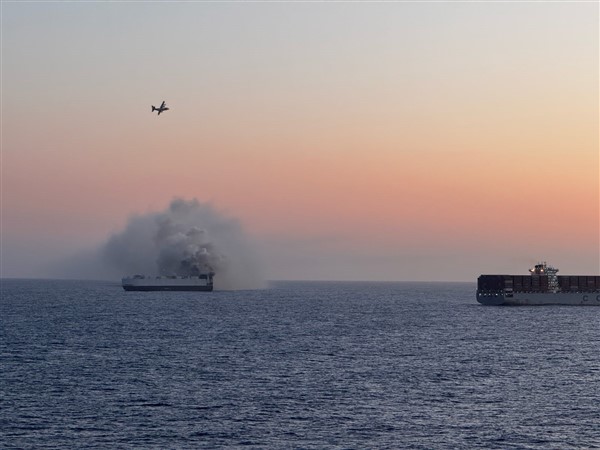Major Fire Engulfs Cargo Ship with Hundreds of EVs Off Alaskan Coast
Anchorage, Alaska – The cargo vessel “Morning Midas,” laden with approximately 3,000 vehicles, including around 800 electric cars, is currently engulfed in flames in the Pacific Ocean off the coast of Alaska. All 22 crew members were successfully evacuated from the burning ship after failing to control the blaze, which is suspected to have originated on a deck carrying electric vehicles, highlighting growing concerns over EV cargo ship fire incidents.
Crew Safe After Abandoning Ship
The drama began when a fire broke out on the Liberian-flagged RoRo (Roll-on/Roll-off) vessel. Zodiac Maritime, the company that manages the Morning Midas, confirmed that the crew of 22 individuals made efforts to extinguish the fire. However, as the situation escalated, the decision was made to abandon ship. The U.S. Coast Guard and other nearby vessels responded, ensuring the safe evacuation of all personnel. There have been no reports of injuries to the crew.

The Morning Midas, a 46,800-ton vessel built in 2006, departed from Yantai, China, on May 26 and was en route to Lazaro Cardenas, Mexico. The specific makes of the vehicles, including the electric models, have not yet been disclosed. The incident has once again brought the potential dangers of transporting electric vehicles, particularly their lithium-ion batteries, to the forefront of maritime safety discussions, making this a significant EV cargo ship fire.
Lithium-Ion Batteries Under Scrutiny
While the exact cause of the fire is still under investigation, initial reports suggest it may have started in an area where electric vehicles were stored. Lithium-ion batteries, which power EVs, are known to be a fire risk if damaged, short-circuited, or improperly managed. Fires involving these batteries can be particularly intense and difficult to extinguish, often requiring vast amounts of water or specialized firefighting agents. This EV cargo ship fire underscores these challenges.
Maritime safety experts and insurers have increasingly pointed to the risks associated with the transportation of lithium-ion batteries. Reports, such as one recently highlighted by insurer Allianz, note that controlling fires originating from electric vehicles is more challenging than conventional vehicle fires. The cooling process for lithium-ion batteries alone can necessitate tens of thousands of liters of water.
Broader Implications for Maritime Transport
As the global electric vehicle market expands, the volume of EVs transported by sea is also increasing. This latest EV cargo ship fire involving the Morning Midas will likely intensify calls for revised safety protocols and potentially new ship design considerations for carriers transporting electric vehicles. Some Chinese EV manufacturers have already begun establishing their own logistics fleets to manage the transportation of their products.
The fate of the Morning Midas and its multi-million dollar cargo of vehicles remains uncertain. Salvage operations will be complex, given the remote location and the ongoing fire. The primary concern for authorities is currently environmental protection and preventing any potential pollution from the stricken vessel. This EV cargo ship fire serves as a stark reminder of the evolving risks in modern maritime logistics.


 ByKus
ByKus Historia
Historia Logos
Logos Humanitas
Humanitas Aesthetica
Aesthetica Cinemania
Cinemania Lingua
Lingua Mythos
Mythos Theologia
Theologia Bibliotecha
Bibliotecha Persona
Persona Quid
Quid News
News Politico
Politico Mundialis
Mundialis Oeconomia
Oeconomia Athletica
Athletica Technologia
Technologia Medicina
Medicina Scientia
Scientia Astronomia
Astronomia













